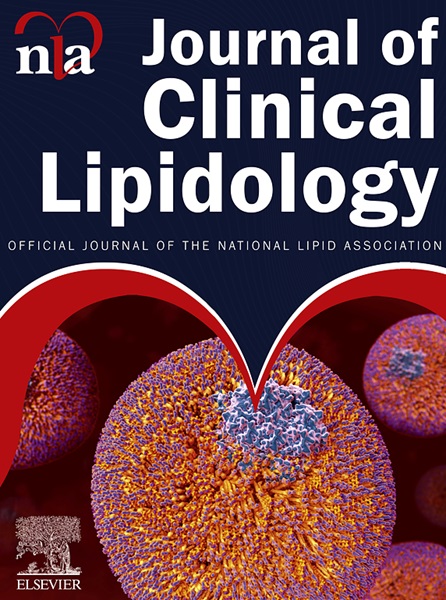在北美制定和验证识别家族性乳糜微粒血症综合征(FCS)的临床标准。
IF 4.6
3区 医学
Q2 PHARMACOLOGY & PHARMACY
引用次数: 0
摘要
背景:家族性乳糜微粒血症综合征(FCS)是一种极罕见的遗传性疾病。基因检测并不总是可行或确凿的。欧洲临床医生制定了 "FCS 评分",以区分 FCS 和多因素乳糜微粒血症综合征 (MCS),后者是一种更常见的疾病,具有重叠的特征。北美地区尚未开发出诊断评分:根据 FCS 的体征、症状和生化特征,为北美患者制定并验证诊断评分:方法: 我们使用兰德/加州大学洛杉矶分校修改过的德尔菲程序,召集了 10 名具有识别和治疗 FCS 经验的美国/加拿大医生和一名 FCS 成年患者。小组制定了 296 个描述 FCS 患者的情景并进行了评分。线性回归分析使用会后评分的中位数来制定评分参数。我们测试了评分的灵敏度、特异性、阳性预测值 (PPV) 和阴性预测值 (NPV),测试对象包括经典 FCS、功能性 FCS 和来自西部大学血脂遗传学诊所登记处的 MCS 患者:根据年龄、高甘油三酯血症发病时间、体重指数、腹痛/胰腺炎病史、是否存在继发性因素、甘油三酯 (TG) 水平、TG/总胆固醇比率和载脂蛋白 B 水平进行数字评分。得分≥60 分表示明确的典型 FCS;在实际登记中,该评分可将 FCS 患者与 MCS 患者区分开来(特异性为 100.0%,敏感性为 66.7%,PPV 为 100.0%,NPV 为 95.5%)。得分≥45分的患者 "极有可能 "患有典型的FCS(特异性为96.9%,敏感性为88.9%):鉴于 NAFCS 评分在区分 FCS 和 MCS 患者方面的简便性和高特异性,NAFCS 评分可用于替代基因检测或在等待基因检测期间优化治疗。本文章由计算机程序翻译,如有差异,请以英文原文为准。
Development and validation of clinical criteria to identify familial chylomicronemia syndrome (FCS) in North America
BACKGROUND
Familial chylomicronemia syndrome (FCS) is an ultrarare inherited disorder. Genetic testing is not always feasible or conclusive. European clinicians developed a “FCS score” to differentiate between FCS and multifactorial chylomicronemia syndrome (MCS), a more common condition with overlapping features. A diagnostic score has not been developed for use in the North American (NA) context.
OBJECTIVE
To develop and validate a diagnostic score for NA patients based on signs, symptoms and biochemical traits of FCS.
METHODS
Using the RAND/UCLA modified Delphi process, we convened 10 US/Canadian physicians with experience recognizing and treating FCS and 1 adult patient with FCS. The panel developed and rated 296 scenarios describing patients with FCS. Linear regression analyses used median post-meeting ratings to develop score parameters. We tested the score's sensitivity, specificity, positive predictive value (PPV), and negative predictive value (NPV) in patients with classical FCS, functional FCS, and MCS from Western University's Lipid Genetics Clinic's registry.
RESULTS
Numerical scores were attributed based upon the following: age, hypertriglyceridemia onset, body mass index, history of abdominal pain/pancreatitis, presence of secondary factors, triglyceride (TG) levels, ratio of TG/total cholesterol, and apolipoprotein B level. Scores ≥ 60 indicate definite classical FCS; the score distinguished patients with FCS from MCS in a real-world registry (100.0% specificity, 66.7% sensitivity, 100.0% PPV, 95.5% NPV). Scores ≥ 45 were “very likely” to have classical FCS (96.9% specificity, 88.9% sensitivity).
CONCLUSION
Given its simplicity and high specificity for distinguishing patients with FCS from MCS, the NAFCS Score could be used in lieu of - or while awaiting - genetic testing to optimize treatment.
求助全文
通过发布文献求助,成功后即可免费获取论文全文。
去求助
来源期刊
CiteScore
7.00
自引率
6.80%
发文量
209
审稿时长
49 days
期刊介绍:
Because the scope of clinical lipidology is broad, the topics addressed by the Journal are equally diverse. Typical articles explore lipidology as it is practiced in the treatment setting, recent developments in pharmacological research, reports of treatment and trials, case studies, the impact of lifestyle modification, and similar academic material of interest to the practitioner.
Sections of Journal of clinical lipidology will address pioneering studies and the clinicians who conduct them, case studies, ethical standards and conduct, professional guidance such as ATP and NCEP, editorial commentary, letters from readers, National Lipid Association (NLA) news and upcoming event information, as well as abstracts from the NLA annual scientific sessions and the scientific forums held by its chapters, when appropriate.

 求助内容:
求助内容: 应助结果提醒方式:
应助结果提醒方式:


